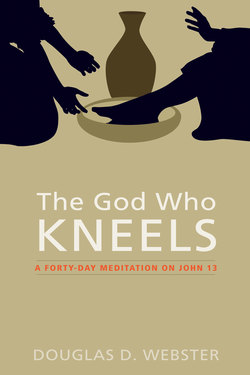Читать книгу The God Who Kneels - Douglas D. Webster - Страница 9
На сайте Литреса книга снята с продажи.
Day 4
ОглавлениеProphet-Pastor-Poet
“One of them, the disciple whom Jesus loved, was reclining next to him.” John 13:23
We know the story line. In the upper room, Jesus washed the disciples’ feet, identified Judas as his betrayer, introduced the new commandment, and warned Peter of his denial. But being able to list what happened doesn’t mean we really know the story. We don’t really know what this text is about until we can describe ourselves the way John described himself: “the disciple whom Jesus loved.” We can translate the text from koine Greek into English and still miss the meaning. Familiarity with this famous biblical scene may interfere with our ability to receive this text. Exposure alone does not equal good exegesis or produce life application. Translating this text into transformative truth calls for prayer and a special kind of attentiveness.
Think of the Spirit-inspired apostle as a poet painting a literary Rembrandt. Every square inch of the canvas deserves out scrutiny. Without a hint of embellishment, John paints with words. He nuances the truth and brings the message home. This rough-hewn Galilean fisherman turned prophet-pastor-poet wove story and dialogue together in a way that invites our deep reflection. The Hellenists looked for beauty in works of art detached from the observer, such as magnificent statues and impressive columns. The Hebrews looked for beauty in the integration of life and meaning, gray hair on an old man, a mother surrounded by her children. Beauty is not observed as an object over against oneself; beauty is beheld in the midst of life. This is the beauty we experience from the inside.
We are on the inside. Upper room access changes the way we see and hear Jesus. We identify with John. We, too, are beloved disciples. John leads us away from the admiring crowd toward authentic discipleship. Like the poet-pastor himself, we qualify as “the disciple whom Jesus loved.” John never meant this as a boast but as a blessing. His endearing and self-effacing way of identifying himself offers no hint of one-upmanship. He is loved the way Jesus means to love all his disciples. We should not confuse intensity with exclusivity. When our children were younger, my wife and I used to say to each of them, “I love you best,” and they knew exactly what we meant.
Jesus accused the religious leaders of his day of possessing the Scriptures but not hearing the voice of God:
“You have never heard his voice nor seen his form nor does his word dwell in you, for you do not believe the one he sent. You study the Scriptures diligently because you think that in them you possess eternal life. These are the very Scriptures that testify about me, yet you refuse to come to me to have life.” John 5:37–40
Jesus said this to so-called “churchmen” steeped in the Scriptures. These Bible scholars had memorized large portions of Scripture. They loved the books of Moses and held them in the highest esteem. But they still didn’t get it. Their small world of religious ritual and tradition was an end in itself. They were indifferent to God’s salvation-making, history-defining Living Word. They did not hear the voice of God. Instead of being transformed by the Word of God, they molded the Bible into their image. They never internalized the message for themselves or read the Bible along its prophetic trajectory. Instead of participating in the drama of salvation history, they stood apart from it, detached, disengaged, and ultimately against the Bible. Yet they thought they had it down pat.
Meditation on the biblical text navigates between the twin dangers of overthinking and underthinking. By overthinking, I mean concentrating on some alleged problem of the text or delving into some intriguing linguistic feature of the text while ignoring the real message. I doubt if anyone could ever overmeditate on John 13, but someone could study the passage without ever embracing the humility of Jesus. In biblical scholarship and popular preaching we face these twin dangers. If we’re not careful we could be left on the outside. Meditation is our way in. Biblical and theological scholarship serve as our escorts. Prayer unlocks the door. The Holy Spirit opens our minds. Jesus welcomes us. John identifies himself as “the disciple whom Jesus loved.” By the grace of God this is our shared identity. Our value and significance comes from being loved by Jesus. The Father’s glory fills the room.
Upper Room Reflection
What draws you in or distances you from this biblical text?
How do you identify with John, the beloved disciple?
Why is John 13 more descriptive than prescriptive?
What has to change in our lives in order to say we understand John 13?
